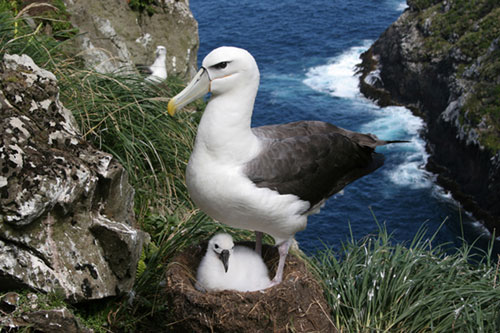A paper recently published in the journal Emu by a group of Uruguayan researchers (Sebastián Jiménez, Andrés Domingo, Alejandro Marquez, Martin Abreu, Alejandro D'Anatro and Alfredo Pereira) reveals that the White-capped Albatross Thalassarche steadi is more common in the south-western Atlantic Ocean than hitherto thought.
Genetic analysis of five "shy-type" albatrosses caught on longlines on the continental slope off Uruguay revealed them all to be White-capped Albatrosses. Observations of birds at sea in the region and identified only as "shy-type" were thus likely to be White-capped Albatrosses. Most of them were immature birds but adults were also seen. Apart from a single bird seen ashore in a breeding colony at Bird Island, South Georgia (Islas Georgias del Sur), and also confirmed genetically (click here), these appear to be the first definite records of the species from the region.

The paper shows that the normal non-breeding range for the White-capped Albatross should be extended to include the south-western Atlantic as well as the waters off southern Africa and Australia (click here to view the ACAP Species Assessment for the White-capped Albatross and for more details and references to its at-sea distribution).
Reference:
Jiménez, S., Domingo, A., Marquez, A., Abreu, M., D'Anatro, A. & Pereira, A. 2009. Interactions of long-line fishing with seabirds in the south-western Atlantic Ocean, with a focus on White-capped Albatrosses (Thalassarche steadi). Emu 109: 321-326. http://www.publish.csiro.au/nid/96/paper/MU09048.htm.
See also a companion paper by Sebastián Jiménez and colleagues in the journal Polar Biology (click here).
John Cooper, ACAP Information Officer, 27 December 2009

 English
English  Français
Français  Español
Español